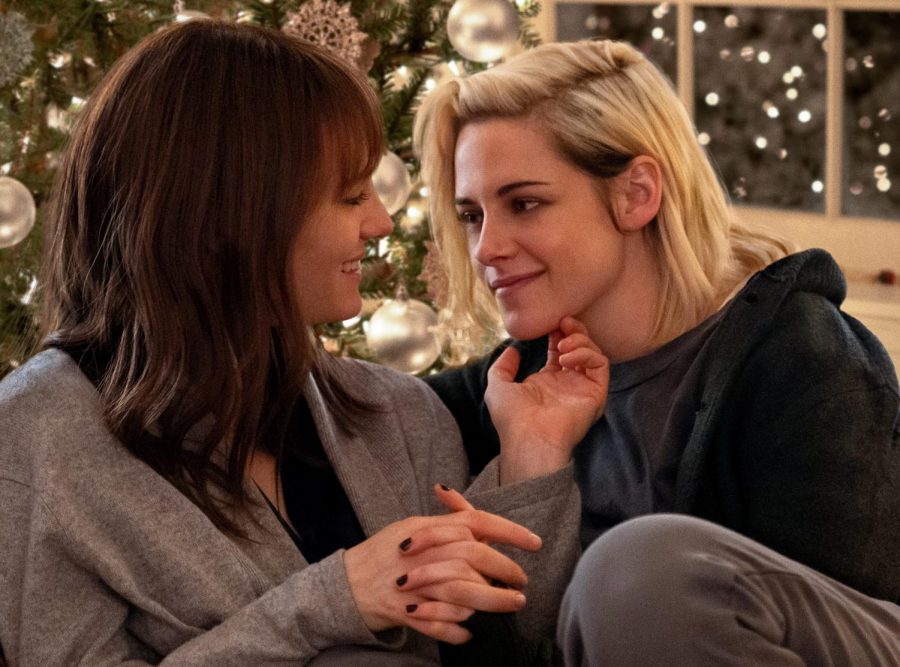‘Happiest Season’ was (kind of) groundbreaking
Abby (Kristen Stewart) and Harper (Mackenzie Davis) play girlfriends in “Happiest Season”. The film is sweet, but ultimately misses the mark.
“Happiest Season” is Hulu’s latest Christmas rom-com, but this time with a twist: the film is about a lesbian couple, subverting typical clichés of the genre in an innovative manner. However, the film is not immune from criticism, especially in regards to the toxicity rampant in the main relationship as well as the choice to make the film center around a coming-out storyline.
The film follows Abby (Kristen Stewart), who agrees to go home with her girlfriend Harper (Mackenzie Davis), for Christmas. However, during the car ride to her home, Harper reveals she lied about coming out to her family, who think Abby is actually her orphaned roommate, and begs Abby to go along with the lie. Abby agrees, but gets way more than she bargained for as she’s thrust into the world of Harper’s image-obsessed family, made up of a hostile sister, judgemental mother, dutiful but perpetually ignored sister and mayoral campaign obsessed father.
As the film progresses, Harper becomes obsessed with maintaining her family’s picture-perfect perception of her. She’s terrified of her family finding out she’s gay, which causes her a rift in her relationship with Abby. The pressures of familial expectation and heteronormativity Harper feels hold weight here, reflecting the experiences of many, especially members of the LGBTQ+ community.
The film is praiseworthy for its groundbreaking queer representation in a genre that has historically only included straight couples. While holiday movies tend to be cheesy and light films, they still represent a form of escapism and fantasy –– one that queer people have been notable excluded from.
On top of that, it’s clear that this film was created by queer people who understood the nuances of what it actually means to be queer. Take the character of Abby, for example, who has bleached hair, carries a tote bag at all times, and wears suits at formal events –– all elements of queer culture. These small details hint at a genuine understanding of queer culture, rather than a depiction that relies on stereotypes, and give the movie an air of authenticity so that “Happiest Season” feels dedicated to telling a real love story between two women.
However, despite the film’s accuracy and the good intentions of many, the film falls into regrettably typical pitfalls of queer representation. Queer viewers, myself included, wanted to see a queer Christmas movie that was just like any other cheesy holiday movie but just happened to be about a lesbian couple instead — not a film centered around the typical coming out storyline. The latter tends to single out queer people, rather than letting them exist and fall in love just like straight people do. Because the film is so centered around Harper’s family, it feels like that film is directed more toward straight people than to queer viewers. Plus, family dynamic often overshadows the main relationship storyline, ultimately leading to an explosive confrontation involving (spoiler alert!) a forced outing. This is unfortunately a common trope, and makes it hard to describe this movie as a lighthearted rom-com when it can be so deeply upsetting for queer people, a large portion of the intended audience, to watch.
The film takes another blow to its Christmas joy thanks to the toxic nature of the leads’ relationship, especially coming from Harper’s side. Throughout the film, she constantly lies to, ignores and sidelines Abby. It’s hard to root for the main couple when we only get to see them happy for 10 minutes of a nearly two-hour film. This is especially compounded when the character of Riley, Harper’s ex-girlfriend played by Aubrey Plaza, is added in. Being consistently ignored by Harper, Abby ends up befriending Riley and bonding with her over what it’s like to be gay in the stifling environment of Harper’s family, as well as the way that Harper has treated them. The chemistry between Abby and Riley had many viewers, myself included, rooting for them to get together, rather than for Abby to end up with Harper.
The film reflects the very real struggles that queer people face, especially around the holidays. It manages to keep an upbeat tone throughout, while still including truly heartfelt and emotional moments. The film received quite a bit of criticism from LGBTQ+ viewers, and though it is not groundbreaking in the world of queer films, it is groundbreaking as an unapologetically queer film in the mainstream.




